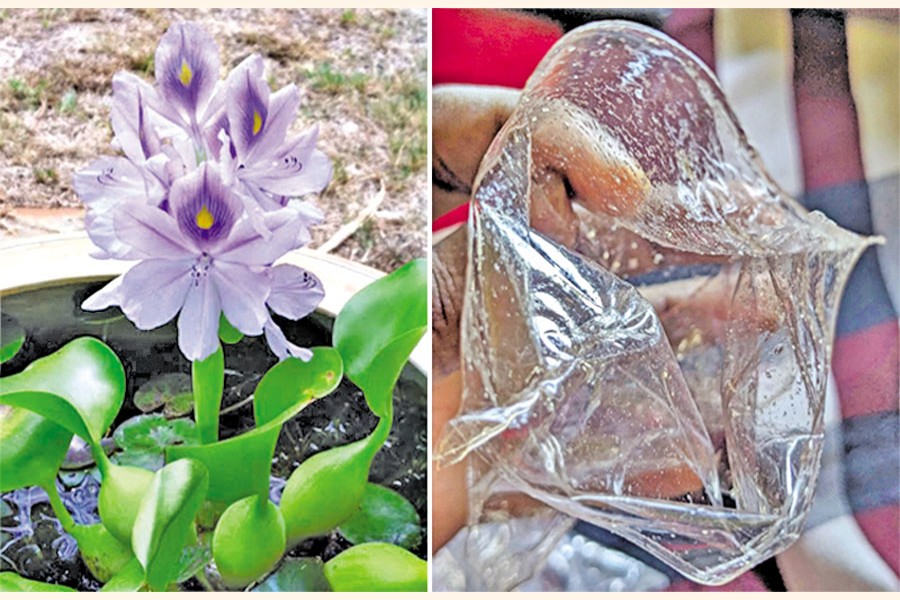Eco-friendly polythene: a solution to pollution
Students-led start-up Environex offers the ‘next big thing’

Published :
Updated :

When traditional plastic polythene bags are posing a serious threat to the environment, start-up entrepreneurs like university students have come up with a unique answer to this perennial problem.
Good news is a group of budding researchers have innovated biodegradable plastic using water hyacinth, which can also address the ubiquitous presence of the invasive aquatic plants in many areas of the country.
"The invention is at the developmental stage, as it requires further research. Funding for it also matters," according to people familiar with this development at Environex, the trailblazing start-up.
The researchers are students of Bangabandhu Sheikh Mujibur Rahman Science and Technology University (BSMRSTU). Sheikh Nishan is from fisheries and marine bioscience, Khademul Saikot from agriculture and Biprodeb Majumder from applied chemistry and chemical engineering.
Dr Neaz Al Hasan, assistant professor of fisheries and marine bioscience at BSMRSTU, and co-supervised by Md Ushama Shafoyat, lecturer of biomedical engineering at the Military Institute of Science and Technology (MIST), supervise the team.
Out of his curiosity in nature conservation, Mr Nishan came up with the primary concept and discussed it with Mr Shafoyat about the possibility of making biodegradable polythene from hyacinth.
"We started research this May and worked hard night and day until October," Mr Nishan told the FE.
The team tried several formulae, searched scholarly articles online and offline, spent day and night for months, yet they failed again and again.
"We perused most of the research articles available online... We failed most of the time, but we didn't lose hope," continued Mr Nishan.
"And finally, we have developed a formula that works wonders. The result is visible now," he told the FE.
The team developed a method to extract cellulose fibres from water hyacinth, creating a polymer-like material that mimics polythene, but it decomposes within six months.
The research cost an estimated Tk 70,000 for chemical and other accessories. Research and tests were accomplished mostly at biomaterial lab of the MIST. Some were done at BSMRUST.
The team recently presented this innovation at University Innovation Hub Programme at BSMRSTU, hosted by ICT Division with the support of the World Bank. They bagged the first position and won Tk 50,000 in prize money.
Mamudul Hasan Likhon, lead mentor of the programme, highly lauded this innovation, Sonali Bag, from Bangladesh that utilised locally available raw materials like water hyacinth.
The success holds the potential of such initiatives in Bangladesh.
"Jute is cultivated in the country, but water hyacinth grows naturally and abundantly. If bio-plastics can be produced on a large scale from water hyacinth, it opens up a huge market at home and abroad," said Mr Likhon, also founder of startup HelloTask.
"The team at Environex is young and dynamic. With adequate funding and support for further R&D, I believe, they have the potential to create commercially viable products from this innovation," he told the FE.
This initiative deserves both recognition and investment to realise its full potential, according to Mr Likhon.
Sources said Bangladesh banned polythene bags in 2002, but more than 300 informal factories continue to produce them.
Dhaka alone consumes an estimated 220-million bags per day.
Meanwhile, the interim government has enforced ban on single-use plastic in super shops and kitchen markets in recent months.
Contacted, Dr Neaz acknowledged the innovation and said there was a need for further standardisation of the product before commercialisation.
"We are... eying to make it economically viable upon availability of funding. At least Tk 10 million is required for further research and development," he added. The budding researchers got approximately Tk 0.3 million from the UGC Research & Development Grant, he told the FE.
The team's short-term target is 120 tonnes of production in the first year upon getting an investment to bring the product to the market, which will gradually be increased as per the demand.
saif.febd@gmail.com


 For all latest news, follow The Financial Express Google News channel.
For all latest news, follow The Financial Express Google News channel.